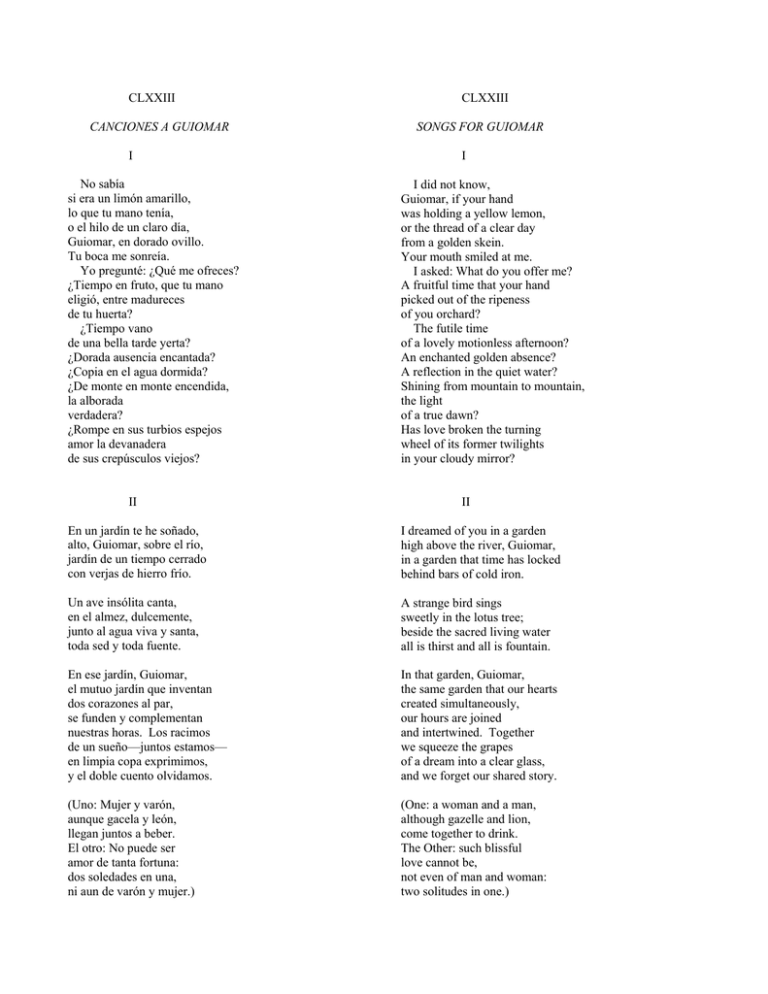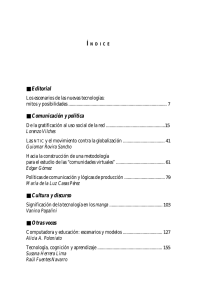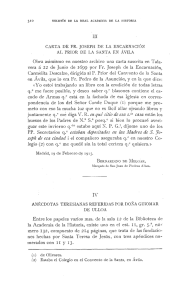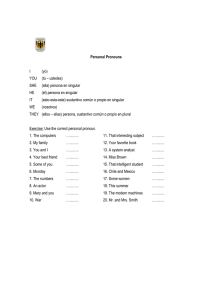CLXXIII CANCIONES A GUIOMAR I No sabía si
Anuncio

CLXXIII CANCIONES A GUIOMAR I No sabía si era un limón amarillo, lo que tu mano tenía, o el hilo de un claro día, Guiomar, en dorado ovillo. Tu boca me sonreía. Yo pregunté: ¿Qué me ofreces? ¿Tiempo en fruto, que tu mano eligió, entre madureces de tu huerta? ¿Tiempo vano de una bella tarde yerta? ¿Dorada ausencia encantada? ¿Copia en el agua dormida? ¿De monte en monte encendida, la alborada verdadera? ¿Rompe en sus turbios espejos amor la devanadera de sus crepúsculos viejos? II CLXXIII SONGS FOR GUIOMAR I I did not know, Guiomar, if your hand was holding a yellow lemon, or the thread of a clear day from a golden skein. Your mouth smiled at me. I asked: What do you offer me? A fruitful time that your hand picked out of the ripeness of you orchard? The futile time of a lovely motionless afternoon? An enchanted golden absence? A reflection in the quiet water? Shining from mountain to mountain, the light of a true dawn? Has love broken the turning wheel of its former twilights in your cloudy mirror? II En un jardín te he soñado, alto, Guiomar, sobre el río, jardín de un tiempo cerrado con verjas de hierro frío. I dreamed of you in a garden high above the river, Guiomar, in a garden that time has locked behind bars of cold iron. Un ave insólita canta, en el almez, dulcemente, junto al agua viva y santa, toda sed y toda fuente. A strange bird sings sweetly in the lotus tree; beside the sacred living water all is thirst and all is fountain. En ese jardín, Guiomar, el mutuo jardín que inventan dos corazones al par, se funden y complementan nuestras horas. Los racimos de un sueño—juntos estamos— en limpia copa exprimimos, y el doble cuento olvidamos. In that garden, Guiomar, the same garden that our hearts created simultaneously, our hours are joined and intertwined. Together we squeeze the grapes of a dream into a clear glass, and we forget our shared story. (Uno: Mujer y varón, aunque gacela y león, llegan juntos a beber. El otro: No puede ser amor de tanta fortuna: dos soledades en una, ni aun de varón y mujer.) (One: a woman and a man, although gazelle and lion, come together to drink. The Other: such blissful love cannot be, not even of man and woman: two solitudes in one.) * Por ti la mar ensaya olas y espumas, y el iris, sobre el monte, otros colores, y el faisán de la aurora, canto y plumas, y el búho de Minerva ojos mayores. Por ti, ¡oh, Guiomar!… III * For you the sea tries out its waves and foam, and the rainbow of colors over the mountains, and the pheasant of dawn, song and feathers, and the large eyes of Minerva’s owl. All for you, oh Guiomar!... III Tu poeta piensa en ti. La lejanía es de limón y violeta, verde el campo todavía. Conmigo vienes, Guiomar: nos sorbe la serranía. De encina en encinar se va fatigando el día. El tren devora y devora día y riel. La retama pasa en sombra; se desdora el oro del Guadarrama. Porque una diosa y su amante huyen juntos, jadeante los sigue la luna llena. El tren se esconde y resuena dentro de un monte gigante. Campos yermos, cielo alto. Tras los montes de granito y otros montes de basalto, ya es la mar y el infinito. Juntos vamos; libres somos. Aunque el Dios, como en el cuento fiero rey, cabalgue a lomos del mejor corcel del viento, aunque nos jure, violento, su venganza, aunque ensille el pensamiento, libre amor, nadie lo alcanza. Your poet thinks of you. The distance becomes lemon and violet, the fields are still green. You are with me, Guiomar: the mountains surround us. From oak grove to oak grove the day is coming to an end. The train devours and devours daylight and rails. Yellow flowers pass by in shadow; the Guadarramas lose their golden color. Because a goddess and her lover are escaping, the breathless full moon pursues them. The train disappears as it passes through a giant mountain. Barren fields, a towering sky. Behind the granite mountains and other mountains of basalt, is the sea and the infinite. We go together; we are free. Even if God, like the fierce king in a story, were to mount a steed as fast as the wind, even if he were to punish us harshly with his vengeance, even if he were to shackle our thoughts, no one can capture a love that is free. * Hoy te escribo en mi celda de viajero, a la hora de una cita imaginaria. Rompe el iris al aire el aguacero y al monte su tristeza planetaria. Sol y campanas en la vieja torre. ¡Oh tarde viva y quieta que opuso al panta rhei su nada corre, tarde niña que amaba tu poeta! ¡Y día adolescente —ojos claros y músculos morenos—, cuando pensaste a Amor junto a la fuente, besar tus labios y apresar tus senos.! * Today I write to you from my travelers cell at the time of an imaginary rendezvous. A rainbow breaks into the air of the storm and the planetary sadness of the mountains. Sunlight and bells in the old tower. Oh, vital and calm afternoon that opposed the panta rhei with its nothing passes, youthful afternoon that your poet loved! And on that adolescent day —bright eyes and sunburned muscles— when you thought of Love beside the fountain, to kiss your lips and hold your breasts! Todo a esta luz de abril se transparenta; todo en el hoy de ayer, el Todavía que en sus maduras horas el tiempo canta y cuenta, se funde en una sola melodía, que es un coro de tardes y de auroras. A ti, Guiomar, esta nostalgia mía. In this April light everything becomes transparent; in the today of yesterday, the Evermore of which time sings and talks in its richest hours, everything is fused into a single melody that is one chorus of evenings and dawns. For you, Guiomar, this nostalgia of mine. CLXXIV CLXXIV OTRAS CANCIONES A GUIOMAR OTHER SONGS FOR GUIOMAR A LA MANERA DE ABEL MARTÍN Y JUAN DE MAIRENA IN THE MANNER OF ABEL MARTIN AND JUAN DE MAIRENA I I ¡Sólo tu figura, como una centella blanca, en mi noche oscura! Only your figure like a bright flash of light in my dark night. * ¡Y en la tersa arena, cerca de la mar, tu carne rosa y morena, súbitamente, Guiomar! * And on the smooth sand near the sea, your rosy and tanned flesh, suddenly, Guiomar! * En el gris del muro, cárcel y aposento, y en un paisaje futuro con sólo tu voz y el viento; * On the gray of the wall, a prison and a lodging, and in a future landscape with only your voice and the wind; * en el nácar frío de tu zarcillo en mi boca, Guiomar, y en el calofrío de una amanecida loca; * on the cold mother-of pearl of your earring on my mouth, Guiomar, and the cold chill of a maddening dawn; * asomada al malecón que bate la mar de un sueño, y bajo el arco del ceño de mi vigilia, a traición, ¡siempre tu! Guiomar, Guiomar, mírame en ti castigado: reo de haberte creado, ya no te puedo olvidar. * looking out from the jetty washed by the sea of a dream, and under the frowning arch of my sleeplessness, treacherously, it is always you! Guiomar, Guiomar, I am punished because of you: guilty of having created you, now I can not forget you. II Todo amor es fantasía; él inventa el año, el día, la hora y su melodía; inventa el amante y, más, la amada. No prueba nada, contra el amor, que la amada no haya existido jamás. III Escribiré en tu abanico: te quiero para olvidarte, para quererte te olvido. IV Te abanicarás con un madrigal que diga: en amor el olvido pone la sal. V Te pintaré solitaria en la urna imaginaria de un daguerrotipo viejo, o en el fondo de un espejo, viva y quieta, olvidando a tu poeta. VI Y te enviaré mi canción: “Se canta lo que se pierde”, con un papagayo verde que la diga en tu balcón. II All love is fantasy; it invents the year, the day, the hour and its melody; it invents the lover, and even the beloved. It proves nothing against love, if the beloved has never existed. III I will write on your fan: I love you in order to forget you, I forget you in order to love you. IV You will fan yourself with a song that says: in love forgetting adds the spice. V I will paint you by yourself on the imaginary urn of an old daguerreotype, or in the depths of a mirror, alert and motionless, forgetting your poet. VI And I will send you my song, with a green parrot who says it on your balcony: “One sings of what is lost.” VII Que apenas si de amor el ascua humea sabe el poeta que la voz engola y, barato cantor se pavonea con su pesar o enluta su vïola; y que si amor da su destello, sola la pura estrofa suena, fuente de monte, anónima y serena. Bajo el azul olvido, nada canta, ni tu nombre ni el mío, el agua santa. Sombra no tiene de su turbia escoria limpio metal; el verso del poeta lleva en ansia de amor que lo engendrara como lleva el diamante sin memoria —frío diamante—el fuego del planeta trocado en luz, en una joya clara… VIII Abre el rosal de la carroña horrible su olvido en flor, y extraña mariposa, jalde y carmín, de vuelo imprevisible, salir se ve del fondo de una fosa. Con el terror de víbora encelada, junto al lagarto frío, con el absorto sapo en la azulada libélula que vuela sobre el río, con los montes de plomo y de ceniza, sobre los rubios agros que el sol de mayo hechiza, se ha abierto un abanico de milagros —el ángel del poema lo ha querido— en la mano creadora del olvido… VII When the embers of love barely smolder, the poet knows his voice becomes pretentious, and like some cheap baritone he flaunts his grief or drapes a black cloth over his viola; but when true love gives off its light, only the pure melody is heard, like a mountain spring, anonymous and serene. Below the blue forgetfulness the sacred water sings neither your name nor mine. The bright metal has no trace of its murky slag; the poet's verse carries the desire for love that created it, in the way a diamond with no memory —a cold diamond—holds the earth's fire transformed into light, into a bright jewel… VIII A flower of forgetfulness opens on the rose bush of horrible rotting flesh, and the unexpected flight of a strange yellow and carmine butterfly is seen rising from the bottom of a grave. With the terror of a frenzied viper next to the lizard's coldness, with the toad fascinated by the blue dragonfly that flies above the river, with the mountains of lead and ashes above the golden fields bewitched by May sunshine, a waft of miracles has been opened —the angel of the poem has willed it— in the creative hand of forgetfulness… (For an interpretation of “Songs for Guiomar” see Chapter V, “Machado’s Mysterious Beloved,” in my book, The Religious and Philosophical Thought of Antonio Machado, also posted on this web site.) http://www.armandfbaker.com/book.html





